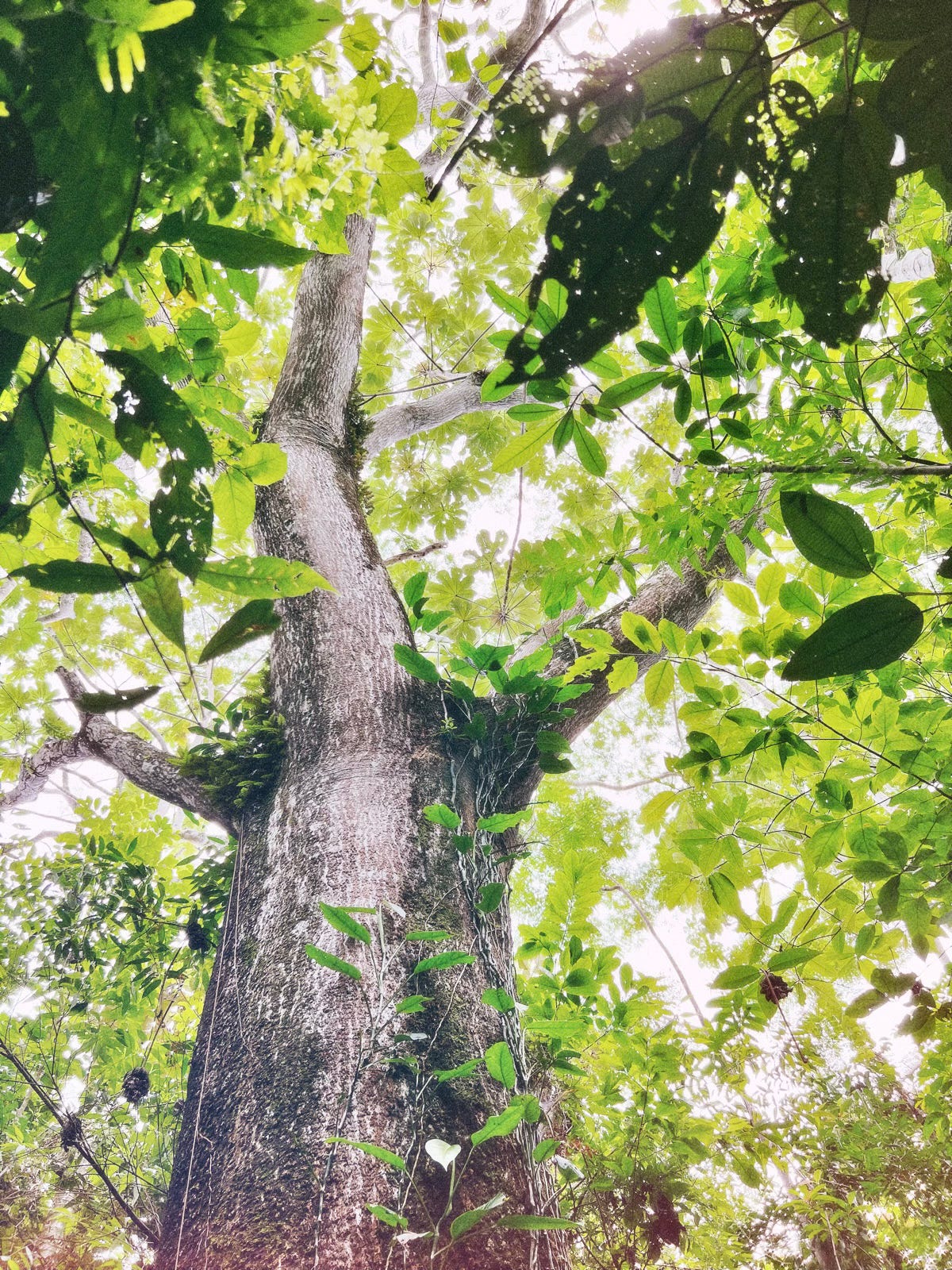Ask “What is this?,” then open yourself completely to what you “hear” in the silence that follows. Be open to this question in the same way as you would listen to a piece of music. Pay total attention to the polyphony of the birds and wind outside, the occasional plane that flies overhead, the patter of rain on a window. Listen carefully, and notice how listening is not just an opening of the mind but an opening of the heart, a vital concern or care for the world, the source of what we call compassion or love.
- Stephen Batchelor
Somewhere in the Costa Rican rainforest a few months ago, a word fell from the treetops and landed in my body. Or maybe, it sprung from the soil deep underground and grew into me, winding its way up from the earth. However it found its way to me, since its first appearance, it has returned again and again, softly whispering itself in my bones. Listen. A word and action that on its surface seems simple enough, but one that reveals more and more facets and applications as I study and practice it, ranging from the relational to the phenomenological. The timing of this word’s appearance has made it a sort of new year’s intention, and every time I hear it, I am reminded of the rainforest and everything I wish to hold close as the days and months continue to fly by.
Listen. I am practicing listening to other people more. This means listening to a broader selection of voices, but it also means less interjecting and interrupting: excitement in a conversation can often result in talking over people in a way I never mean to, but still happens more often than I like. Listen. Less chatting to fill the space between words, more being a witness to another person as they are, more being a quiet companion to others in the mess of life.
Listen. More music. One of my favorite parts of my day has been the hour that my headphones are injecting carefully selected songs directly into my bloodstream and I dance around my tiny home with reckless abandon. Music and free-flow movement have been an obvious but powerful deepening of my embodiment practices, expression, and somatic receptiveness. Dance, even at its most fun, even when alone, can still become, in a sense, a performance, a display, a skill we are either “good” or “bad” at — but the practice of letting the energy of music absorb itself into my nervous system, flooding and animating my muscles into a movement that “I” don’t have any real part in or thoughts about has been both liberating and grounding.
If we accept that sound is vibration and we know that vibration touches every part of our physical being, then we understand that sound is heard not only through our ears but through every cell in our bodies.
- Mitchell Gaynor, M.D.
Sound is feeling. We listen with our whole bodies, and I’ve been listening even closer to mine, which is to say I am learning to feel it more clearly and inhabit it more fully. I’ve been paying closer attention to what is happening within at any given moment, experiencing the different tones and timbres that zip and pulse, watching the shifting patterns of energy and instinct push through me and out into the world. I’ve been listening to how the environments I inhabit permeate me and shape and influence me, noticing how it plays into a greater whole, studying the places where the new pushes up against the old, feeling the patterning transmute and unfold.
Listen. I’ve been listening to the earth more, which is to say, letting my exhausted ego take a rest from its incessant concerns, and noticing how all thoughts suspend themselves entirely as the richness of sound moves in and blooms in their place. This listening, as decreed by the trees themselves, has become an experience where my “self” is replaced in full by the haze of the ocean meeting the distant reef, or the birds loudly sharing stories among the palms, or the hush of the wind pushing itself hastily along the earth.
There is an is-ness of sound that has become my teacher. Because to some degree, we think we can choose what we see, at least insofar as our ability to freely move around our field of visual focus. We like to think the same about touch and taste, as they seem to be selected by our personal choices, enhanced by their physical proximity to us. But sound has a special quality of perception, in that everything in our surrounding environment that can be heard will be — everything makes its way to us no matter what. Surely some sounds can sit in our periphery just like vision, and we can move our focus of listening around. But we can’t quite close our ears as we can close our eyes, and turning away can’t keep us from hearing -- sound is far more pervasive. We can’t accept or reject it. It is choiceless. It just is.
There isn’t any agency in sound, the self has no levers to pull or power to wield, it is simply the naked phenomenon of the environment meeting a perfectly designed sense organ, and an awareness receiving it. This quality is one that we can come to understand in all of our senses and all of our experience, and one that has taught me much about my true nature, what some Buddhists call emptiness, the fundamental truth of what I am.
Listen. The vanishing quality of sound asks us to drop our clinging, our fantasies about the future or ruminations about the past. Life can only be heard here and now. It all just appears and just as quickly, it is gone, perpetually appearing and vanishing, always, forever. But when we listen, in a way that is both entirely free of any efforting and yet also clear and unobstructed, the busy streets of our mind become a spacious and empty room, the door and windows thrown open, letting the breeze of the world move through the boundless space of consciousness, softly appearing and dissolving, here then gone.
At first, from where does mind arise? Right now, where does it stay? At the end, look into where it goes! When your mind looks into itself, it finds no place from where it arises, remains, or goes to. There is no explanation of “this is how it is.” “Mind” is discovered to be without something outside or inside. It does not have someone that looks; it is not the act of looking. It is experienced as a great original wakefulness without center or edge, an immense all-pervasiveness that is primordially empty and free. This original wakefulness is intrinsic and self-existing.
-Padmasambhava
Listening allows me to be less of a frantic meaning-making self and more of a present, considerate and attentive human. It asks me to tune in to the inner expanse of experience, it turns me into conduit of energy that flows and feels, a moving amalgam of lenses and sensors that receives and reflects the magic of the world it inhabits.
I wondered at first why listen was the word that appeared that day, but now I understand. When I listen, I am given the gift of briefly becoming nothing — nothing but the open space in which birds sing and thunder growls and laughter howls. I am sound, which in turn, makes me everything.
xo, Taylor
You might also enjoy:








Another beautiful brilliant and insightful essay Taylor. I love so much about it and it will be one I reread again (as I do so many of your pieces). I especially thank you for pointing out that sound is choiceless most of the time. We do have to make some effort both to attune to and appreciate it and to choose what to listen to. The experience of hearing loss has made me less tolerant of noise and more appreciative of sound, especially the sounds of nature, music and the voices of those I love for fear I may one day no longer hear them at all.
Thank you for this beautiful writing of how listening to the sounds in my environment enables me to open up and be present. Such a powerful practice!